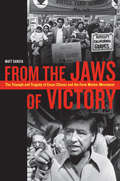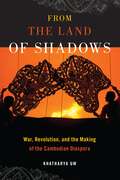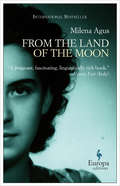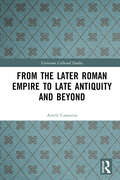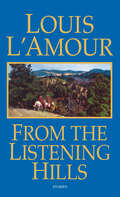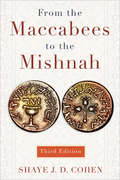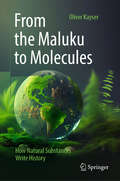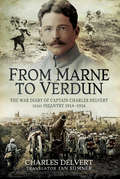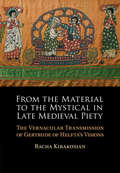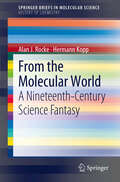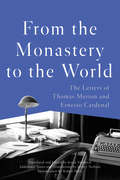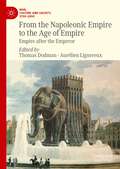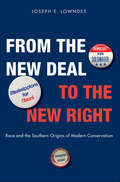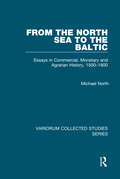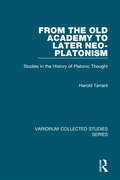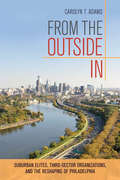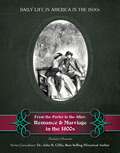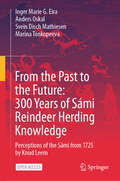- Table View
- List View
From the Jaws of Victory
by Matthew GarciaFrom the Jaws of Victory:The Triumph and Tragedy of Cesar Chavez and the Farm Worker Movement is the most comprehensive history ever written on the meteoric rise and precipitous decline of the United Farm Workers, the most successful farm labor union in United States history. Based on little-known sources and one-of-a-kind oral histories with many veterans of the farm worker movement, this book revises much of what we know about the UFW. Matt Garcia's gripping account of the expansion of the union's grape boycott reveals how the boycott, which UFW leader Cesar Chavez initially resisted, became the defining feature of the movement and drove the growers to sign labor contracts in 1970. Garcia vividly relates how, as the union expanded and the boycott spread across the United States, Canada, and Europe, Chavez found it more difficult to organize workers and fend off rival unions. Ultimately, the union was a victim of its own success and Chavez's growing instability. From the Jaws of Victory delves deeply into Chavez's attitudes and beliefs, and how they changed over time. Garcia also presents in-depth studies of other leaders in the UFW, including Gilbert Padilla, Marshall Ganz, Dolores Huerta, and Jerry Cohen. He introduces figures such as the co-coordinator of the boycott, Jerry Brown; the undisputed leader of the international boycott, Elaine Elinson; and Harry Kubo, the Japanese American farmer who led a successful campaign against the UFW in the mid-1970s.
From the Jewish Heartland: Two Centuries of Midwest Foodways
by Ellen F. Steinberg Jack H. ProstFrom the Jewish Heartland: Two Centuries of Midwest Foodways reveals the distinctive flavor of Jewish foods in the Midwest and tracks regional culinary changes through time. Exploring Jewish culinary innovation in America's heartland from the 1800s to today, Ellen F. Steinberg and Jack H. Prost examine recipes from numerous midwestern sources, both kosher and nonkosher, including Jewish homemakers' handwritten manuscripts and notebooks, published journals and newspaper columns, and interviews with Jewish cooks, bakers, and delicatessen owners. With the influx of hundreds of thousands of Jews during the late nineteenth and early twentieth centuries came new recipes and foodways that transformed the culture of the region. Settling into the cities, towns, and farm communities of Ohio, Indiana, Wisconsin, Michigan, Illinois, Missouri, Iowa, and Minnesota, Jewish immigrants incorporated local fruits, vegetables, and other comestibles into traditional recipes. Such incomparable gustatory delights include Tzizel bagels and rye breads coated in midwestern cornmeal, baklava studded with locally grown cranberries, dark pumpernickel bread sprinkled with almonds and crunchy Iowa sunflower seeds, tangy ketchup concocted from wild sour grapes, Sephardic borekas (turnovers) made with sweet cherries from Michigan, rich Chicago cheesecakes, native huckleberry pie from St. Paul, and savory gefilte fish from Minnesota northern pike. Steinberg and Prost also consider the effect of improved preservation and transportation on rural and urban Jewish foodways, as reported in contemporary newspapers, magazines, and published accounts. They give special attention to the impact on these foodways of large-scale immigration, relocation, and Americanization processes during the nineteenth century and the efforts of social and culinary reformers to modify traditional Jewish food preparation and ingredients. Including dozens of sample recipes, From the Jewish Heartland: Two Centuries of Midwest Foodways takes readers on a memorable and unique tour of midwestern Jewish cooking and culture.
From the Knights of Labor to the New World Order: Essays on Labor and Culture (500 Tips #Vol. 1089)
by Paul BuhleThis collection brings together the labor and cultural studies of the author over the past 20 years, during which time the fields of social history, women's history, ethnic studies, public history, and oral history have all been transformed. The essays, some rewritten or newly available and the rest original to this volume, offer important examples of historical analysis, comment on changing scholarly perceptions, and the public uses of history. By drawing upon his own research in popular culture, Yiddish periodicals, interracial unionism, oral history and a variety of other sources, the author demonstrates how the field of labor specialists has become the domain of social historians exploring a rich American past.
From the Land of Shadows: War, Revolution, and the Making of the Cambodian Diaspora (Nation of Nations #14)
by Khatharya UmIn a century of mass atrocities, the Khmer Rouge regime marked Cambodia with one of the most extreme genocidal instances in human history. What emerged in the aftermath of the regime's collapse in 1979 was a nation fractured by death and dispersal. It is estimated that nearly one-fourth of the country's population perished from hard labor, disease, starvation, and executions. Another half million Cambodians fled their ancestral homeland, with over one hundred thousand finding refuge in America.From the Land of Shadows surveys the Cambodian diaspora and the struggle to understand and make meaning of this historical trauma. Drawing on more than 250 interviews with survivors across the United States as well as in France and Cambodia, Khatharya Um places these accounts in conversation with studies of comparative revolutions, totalitarianism, transnationalism, and memory works to illuminate the pathology of power as well as the impact of auto-genocide on individual and collective healing. Exploring the interstices of home and exile, forgetting and remembering, From the Land of Shadows follows the ways in which Cambodian individuals and communities seek to rebuild connections frayed by time, distance, and politics in the face of this injurious history.
From the Land of the Moon
by Milena Agus“Powerful . . . The vivid descriptions of the Sardinian landscape are a fitting complement to the heroine’s conflicted heart” (Kirkus Reviews, starred review).As this compelling novel opens, a young unnamed woman reflects on the life of her bewitching, eccentric, and fiercely emotional grandmother, whose abiding search for love spans much of the twentieth century. In 1943, as American bombs fall on the city of Cagliari, she is thirty and considered an old maid, still living at home with her parents. But when the bombing ceases, and despite her protests, her father forces her to marry the first man to propose, an older widower she doesn’t love. After suffering several miscarriages, she is sent for treatment at a spa on the mainland, where she falls in love with an injured Italian army veteran. Back home, she gives birth to a son. She never reveals the affair to her husband—but decades later, she returns to the mainland and travels to her former lover’s hometown of Milan. Dressed in her finest coat and shoes, she wanders the streets in search of the elusive veteran . . .Set against a backdrop of rugged mountains and Italian villages lost in time, this international bestselling novel is a multigenerational family saga about love, lust, and country.“Agus’s descriptions of the everyday are as beautiful and haunting as her portrayal of life’s most dramatic episodes. Add an unexpected ending and the result is a graceful, powerful book.” —Publishers Weekly (starred review)
From the Later Roman Empire to Late Antiquity and Beyond (Variorum Collected Studies)
by Averil CameronAveril Cameron is one of the leading historians of late antiquity and Byzantium. This collection (Cameron’s third in the Variorum series) discusses the changing approach among historians of the later Roman empire from the 1960s to the present and the articles reproduced have been chosen to reflect both these wider changes in treatments of the subject as well as Cameron’s own development as a historian over many decades. It provides a revealing and important survey of some profound historiographical changes. Her volume contains fundamental papers and reviews that tell a story in which she has played a leading part. They move from her early days as an ancient historian to her important contribution in the establishment of the field of late antiquity and point to her later work as a Byzantinist, a trajectory rivalled by few other scholars. The book will be important for scholars and students of the later Roman empire and late antiquity, and for anyone interested in the inheritance of Edward Gibbon, the perennial questions about the end of the Roman empire and its supposed decline, or the emergence of Islam in the early seventh century and its relation to the late antique world.
From the Listening Hills
by Louis L'AmourIn peerless fiction spanning five decades and as many continents, Louis L'Amour has proven himself the preeminent storyteller of the American experience. Whether set aboard a ship trapped in enemy seas or amidst a showdown in the deserts of Death Valley, his stories brilliantly capture the heroic and indomitable spirit of our great land.From The Listening HillsThe twelve stories in this collection--appearing for the first time in one complete volume--run the spectrum of human emotions as they transport us from the fading majesty of the Old West to a small-town football field to the lonely canyons of one man's mind. These classic tales of adventure, mystery, mysticism, and suspense epitomize the uniquely American yearning for connection and roots, justice and love, as only L'Amour can. Here is a diverse group of heroes and traitors, outlaws and lawmen, the innocent, the guilty, and those who operate in the shadowy territory outside the reach of justice. The wastelands of Death Valley form the backdrop for the tale of a desperate man who leads his pursuers into a desert trap--where heat and thirst are his only weapons. A rodeo rider framed for a crime he didn't commit takes a wild ride on a legendary bronco that may help him catch the real killers. An American pilot flies Russian and British agents into the labyrinthine forests of Asiatic Russia--only to discover that one of them is a traitor. A hit man discovers the fatal limits of friendship; and a quest for revenge becomes a frantic race to find a cache of gold hidden in the drifting sands of the Southwest. And in a powerful and moving parable, an Indian boy must lead his family across a drought-ravaged land with nothing to guide him but his faith.The gripping title story counts down the final hours of a wounded man struggling to fend off his enemies and certain death. Before time runs out, he must finish the most important task of his life: a letter to his unborn son that will vindicate the family name.Filled with a special brand of passion and drama, From the Listening Hills is an exemplary collection that showcases the enduring talents of one of America's most beloved authors.From the Hardcover edition.
From the Maccabees to the Mishnah
by Shaye J. D. CohenIn this new edition of a best-selling classic, Shaye Cohen offers a thorough analysis of Judaism's development from the early years of the Roman Empire to the formative period of rabbinic Judaism. Cohen's synthesis of religion, literature, and history offers deep insight into the nature of Judaism at this key period, including the relationship between Jews and Gentiles, the function of Jewish religion in the larger community, and the development of normative Judaism and other Jewish sects. In addition, Cohen provides clear explanations concerning the formation of the biblical canon and the roots of rabbinic Judaism. Now completely updated and revised, this book remains the clearest introduction to the era that shaped Judaism and provided the context for early Christianity. The Library of Early Christianity is a series of eight outstanding books exploring the Jewish and Greco-Roman contexts in which the New Testament developed.
From the Maluku to Molecules: How Natural Substances Write History
by Oliver KayserNatural products are a marvel of evolution. Plants are chemical factories and have produced a vast number of highly diverse and interesting natural substances with their extraordinary properties, which we humans have been using for centuries to relieve and cure diseases. At the latest since the discovery of penicillin, natural substances have become an important source of medicines, but we know only very few of the presumably many millions that are still waiting to be discovered. Important antibiotics, immunosuppressants, anticancer agents, hormones, and antiviral agents are among the natural products. But do natural products still matter in the age of biotechnology and genetic engineering? Yes, more than ever, because medicinal chemists draw creative inspiration for their syntheses from nature to develop the next blockbuster in medicine. Oliver Kayser tells the story of natural products and medicinal plants in this book in a highly informative and amusing way from a new perspective. He explores how natural products from naturopathy gave birth to the pharmaceutical industry, how they shaped our society as medicines and remedies, enabled wars, and paved the way to Nobel Prizes. The author paints a fascinating panorama of natural product chemistry in plants, microorganisms, and animals. Starting with the first isolations at the beginning of the industrial revolution, he leads us with the ideas and enthusiasm of many scientists into the modern era of drug testing, computer chemistry, and the highly successful serendipitous discoveries of active ingredients. Natural product research in the laboratory has an enormous impact on our lives today. The author offers a glimpse over the shoulder of how the search for the new drugs of tomorrow works today. This book is the ultimate book from the pen of a scientist deeply rooted in research, providing the reader with an enlightening and at the same time entertaining insight into how scientists think and how arduous research can be.
From the Margins: Historical Anthropology and Its Futures
by Brian Keith AxelHistorical anthropology: critical exchange between two decidedly distinct disciplines or innovative mode of knowledge production? As this volume's title suggests, the essays Brian Keith Axel has gathered in From the Margins seek to challenge the limits of discrete disciplinary epistemologies and conventions, gesturing instead toward a transdisciplinary understanding of the emerging relations between archive and field. In original articles encompassing a wide range of geographic and temporal locations, eminent scholars contest some of the primary preconceptions of their fields. The contributors tackle such topics as the paradoxical nature of American Civil War monuments, the figure of the "New Christian" in early seventeenth-century Peru, the implications of statistics for ethnography, and contemporary South Africa's "occult economies. " That anthropology and history have their provenance in--and have been complicit with--colonial formations is perhaps commonplace knowledge. But what is rarely examined is the specific manner in which colonial processes imbue and threaten the celebratory ideals of postcolonial reason or the enlightenment of today's liberal practices in the social sciences and humanities. By elaborating this critique, From the Margins offers diverse and powerful models that explore the intersections of historically specific local practices with processes of a world historical order. As such, the collection will not only prove valuable reading for anthropologists and historians, but also for scholars in colonial, postcolonial, and globalization studies. Contributors. Talal Asad, Brian Keith Axel, Bernard S. Cohn, Jean Comaroff, John L. Comaroff, Nicholas B. Dirks, Irene Silverblatt, Paul A. Silverstein, Teri Silvio, Ann Laura Stoler, Michel-Rolph Trouillot
From the Marne to Verdun: The War Diary of Captain Charles Delvert, 101st Infantry, 1914–1916
by Charles DelvertCharles Delverts diary records his career as a front-line officer in the French army fighting the Germans during the First World War. It is one of the classic accounts of the war in French or indeed in any other language, and it has not been translated into English before. In precise, graphic detail he sets down his wartime experiences and those of his men. He describes the relentless emotional and physical strain of active service and the extraordinary courage and endurance required in battle. His account is essential reading for anyone who is keen to gain a direct insight into the Great War from the French soldier's point of view, and it bears comparison with the best-known English and German memoirs and journals of the Great War.
From the Marne to Verdun: The War Diary of Captain Charles Delvert, 101st Infantry, 1914–1916
by Charles DelvertCharles Delverts diary records his career as a front-line officer in the French army fighting the Germans during the First World War. It is one of the classic accounts of the war in French or indeed in any other language, and it has not been translated into English before. In precise, graphic detail he sets down his wartime experiences and those of his men. He describes the relentless emotional and physical strain of active service and the extraordinary courage and endurance required in battle. His account is essential reading for anyone who is keen to gain a direct insight into the Great War from the French soldier's point of view, and it bears comparison with the best-known English and German memoirs and journals of the Great War.
From the Material to the Mystical in Late Medieval Piety: The Vernacular Transmission of Gertrude of Helfta's Visions
by Racha KirakosianThe German mystic Gertrude the Great of Helfta (c.1256–1301) is a globally venerated saint who is still central to the Sacred Heart Devotion. Her visions were first recorded in Latin, and they inspired generations of readers in processes of creative rewriting. The vernacular copies of these redactions challenge the long-standing idea that translations do not bear the same literary or historical weight as the originals upon which they are based. In this study, Racha Kirakosian argues that manuscript transmission reveals how redactors serve as cultural agents. Examining the late medieval vernacular copies of Gertrude's visions, she demonstrates how redactors recast textual materials, reflected changes in piety, and generated new forms of devotional practices. She also shows how these texts served as a bridge between material culture, in the form of textiles and book illumination, and mysticism. Kirakosian's multi-faceted study is an important contribution to current debates on medieval manuscript culture, authorship, and translation as objects of study in their own right.
From the Molecular World
by Alan J. Rocke Hermann KoppHermann Kopp (1817-1892) is best remembered today as a historian of chemistry, but during his lifetime he was one of the most eminent chemists of his day, and one of the earliest pioneers of physical chemistry. Late in his career he wrote an endearing fantasy about personified molecules. Published in 1882, Aus der Molecular-Welt (From the Molecular World) portrayed the intimate details of what might actually be happening in the sub-microscopic world; the atoms and molecules we meet there have agency, personalities, sometimes even dialog. Filled with appealing tropes, humor, and whimsical asides, Kopp's short book provided an examination of the chemistry and physics of his day that was always light-hearted on the surface, but often surprisingly profound. Properly interpreted, the book provides a revealing tour of nineteenth-century debates concerning chemical theory. It is here translated into English, richly annotated, and equipped with an illuminating preface by a leading historian of chemistry. It provides entertaining reading to practicing chemists, as well as new insights to historians of science.
From the Monastery to the World: The Letters of Thomas Merton and Ernesto Cardenal
by Thomas Merton Ernesto CardenalThomas Merton and Ernesto Cardenal were both poets and priests, wholly committed to a life of spiritual contemplation which was never far from the gritty work that lead them to risk life and reputation in order to raise worldwide consciousness concerning issues of social justice and the abuse of human rights. From the Monastery to the World collects the complete correspondence between these spiritual men and dedicated activists, translated into English for the first time.The letters in this book, written between Merton and Cardenal from 1959–1968, give us fascinating insights into the early spiritual and political awakenings of eventual Sandinista and exponent of liberation theology Ernesto Cardenal, who was then a novice leaving the Trappist Monastery in Kentucky where he first met Merton. While making the long trip home to Nicaragua to build a utopian artist's commune on the Island of Solentiname, Cardenal rubs elbows with some of Latin America's greatest writers and artists of that time.In From the Monastery to the World, Cardenal is still a hungry pupil, years away from becoming the internationally renowned poet–statesman and Nicaraguan Minister of Culture. Here we see the poet and monk Thomas Merton as a wise, patient, and sometimes even humbled mentor, during the years when he was still shaping and collecting the raw materials for such writings as: "The Way of Chuang Tzu", "Raids on the Unspeakable", and "Conjectures of a Guilty Bystander".Merton and Cardenal's correspondence grants readers an audience to conversations between two men deeply connected by their vigorous endeavors toward spiritual freedom, voracious intellectual appetites, and artistic exploration despite the cultural differences, language barriers, and geographic distances which divide them.
From the Mouth of the Whale
by SjónShortlisted for The International IMPAC Dublin Literary Prize 2013 Shortlisted for the Independent Foreign Fiction Prize 2012'Sjón's novels are brilliant collisions of history and fable, psychology and fantasy' Chris Power, GuardianThe year is 1635. Iceland is a world darkened by superstition, poverty and cruelty. Men of science marvel over a unicorn s horn, poor folk worship the Virgin in secret and both books and men are burnt. Jónas Pálmason, a poet and self-taught healer, has been condemned to exile for heretical conduct, having fallen foul of the local magistrate. Banished to a barren island, Jónas recalls his exorcism of a walking corpse on the remote Snjáfjöll coast, the frenzied massacre of innocent Basque whalers at the hands of local villagers, and the deaths of three of his children.From the Mouth of the Whale is a magical evocation of an enlightened mind and a vanished age.
From the Napoleonic Empire to the Age of Empire: Empire after the Emperor (War, Culture and Society, 1750–1850)
by Thomas Dodman Aurélien LignereuxThis book explores imperial entanglements to reassess the Napoleonic Empire as a missing link—or at least an important chain—in the global and longue durée history of Empires. In recent years Napoleonic studies have, belatedly but resolutely, embraced the transnational historiographical turn, vastly expanding the field’s geographical scope. Its canonical chronological boundaries, on the other hand, appear increasingly narrow against this wider backdrop, giving the impression of a parenthetical, almost anachronistic aside from 1799 to 1815. What connects, and what doesn’t connect, the Napoleonic Empire to the Age of Empire, remains by and large an open question. Put another way, this book attempts to locate the Napoleonic empire in World History.
From the New Deal to the New Right
by Joseph E. LowndesThe role the South has played in contemporary conservatism is perhaps the most consequential political phenomenon of the second half of the twentieth century. The region's transition from Democratic stronghold to Republican base has frequently been viewed as a recent occurrence, one that largely stems from a 1960s-era backlash against left-leaning social movements. But as Joseph Lowndes argues in this book, this rightward shift was not necessarily a natural response by alienated whites, but rather the result of the long-term development of an alliance between Southern segregationists and Northern conservatives, two groups who initially shared little beyond opposition to specific New Deal imperatives. Lowndes focuses his narrative on the formative period between the end of the Second World War and the Nixon years. By looking at the 1948 Dixiecrat Revolt, the presidential campaigns of George Wallace, and popular representations of the region, he shows the many ways in which the South changed during these decades. Lowndes traces how a new alliance began to emerge by further examining the pages of theNational Reviewand Republican party-building efforts in the South during the campaigns of Eisenhower, Goldwater, and Nixon. The unique characteristics of American conservatism were forged in the crucible of race relations in the South, he argues, and his analysis of party-building efforts, national institutions, and the innovations of particular political actors provides a keen look into the ideology of modern conservatism and the Republican Party.
From the North Sea to the Baltic: Essays in Commercial, Monetary and Agrarian History, 1500-1800 (Variorum Collected Studies)
by Michael NorthThe Baltic in the early modern period has been called a 'Nordic Mediterranean'. In the studies collected here, Professor North is concerned to examine the ways in which this Baltic region became integrated into the international division of labour and the emerging world economy. The volume opens with a new introductory essay, and the first section then focuses on commodities exported to Western Europe - grain, timber, flax, hemp and other raw materials. The following studies examine how this ever growing bulk trade stimulated a flow of money and payments in the opposite direction, and led to the formation of the manorial economy and second serfdom in the grain-producing countries of the Baltic hinterlands.
From the Old Academy to Later Neo-Platonism: Studies in the History of Platonic Thought (Variorum Collected Studies)
by Harold TarrantThis volume collects a set of papers on ancient Platonism that span the nine centuries between Plato himself and his commentator Olympiodorus in the 6th century, many of them less easy to obtain. Much of the work is at the intersection of philosophy and literature, and a recurrent aim is to challenge existing orthodoxies and to suggest alternatives. Two further related aims are to encourage the rereading of Plato in the light of the later tradition, and the tradition in the light of influential passages of Plato. The articles are grouped here in three sections, dealing first with Socrates, Plato and the Old Academy, then with the Platonic revival and the 2nd century AD, and finally with later Neoplatonism.
From the Outside In: Suburban Elites, Third-Sector Organizations, and the Reshaping of Philadelphia
by Carolyn T. AdamsIn From the Outside In, Carolyn T. Adams addresses the role of suburban elites in setting development agendas for urban municipalities and their larger metropolitan regions. She shows how major nongovernmental, nonmarket institutions are taking responsibility for reshaping Philadelphia, led by suburban and state elites who sit on boards and recruit like-minded suburban colleagues to join them. In Philadelphia and other American cities, Third Sector organizations have built and expanded hospitals, universities, research centers, performing arts venues, museums, parks, and waterfronts, creating whole new districts that are expanding outward from the city's historic downtown. The author draws on three decades of scholarship on Philadelphia and her personal experience in the city's nonprofit world to argue that suburban elites have recognized the importance of the central city to their own future and have intervened to redevelop central city land and institutions. Suburban interests and state allies have channeled critical investments in downtown development and K-12 education. Adams contrasts those suburban priorities with transportation infrastructure and neighborhood redevelopment, two policy domains in which suburban elites display less strategic engagement. From the Outside In is a rich examination of the promise and difficulty of governance that is increasingly distinct from elected government and thus divorced from the usual means of democratic control within an urban municipality.
From the PS to the LHC - 50 Years of Nobel Memories in High-Energy Physics
by Luis Alvarez-Gaumé Emmanuel Tsesmelis Michelangelo ManganoThis collection of lectures and essays by eminent researchers in the field, many of them nobel laureates, is an outgrow of a special event held at CERN in late 2009, coinciding with the start of LHC operations. Careful transcriptions of the lectures have been worked out, subsequently validated and edited by the lecturers themselves. This unique insight into the history of the field includes also some perspectives on modern developments and will benefit everyone working in the field, as well as historians of science.
From the Parlor to the Altar: Romance and Marriage in the 1800s (Daily Life in America in the 1800s)
by Zachary ChastainWe're all here because of people who met and fell in love in the past! In the 1800s, most young men and women were bound by powerful traditions of family, church, and society that limited their choices in romance and marriage. As an economic and community-building institution, marriage options were traditionally controlled by the older generation. Marriages were often arranged by families, and the bride and groom's personal feelings for each other were much less important than they are today. But as in so many other ways, America was a new and more open society. Communities of people from different and diverse backgrounds were established in a new land, and young people came together in a freer, more open environment. Romantic love flourished in the America of the 1800s as it never had before, with a whole variety of courting and marriage customs, many of which we still cherish today.
From the Past to the Future: Perceptions of the Sámi from 1725 by Knud Leem
by Anders Oskal Svein Disch Mathiesen Marina Tonkopeeva Inger Marie EiraThis open access book provides a unique way of documenting traditional Sámi knowledge that has survived almost 300 years followed by today&’s analysis of the modern state of Sámi reindeer husbandry. Reindeer herders&’ knowledge, their language and ways of managing the herds have hardly changed over the past centuries. It is the same ancient knowledge that now forms the basis for how reindeer herders think and carry out their operations. The book shows sustainable reindeer husbandry—with long continuity in knowledge and practices—which is still used today. It gives an overview of the knowledge systems and technical language of an ancient industry that has survived through millennia and is still crucial today. Our vision with this book is to highlight the long perspectives of Sámi reindeer herders&’ indigenous knowledge based on what Knud Leem did at the beginning of the eighteenth century. The content is based on Knud Leem's translated version of Description over Finmarkens Lapper, their language of language, lifestyle and past idolatry. There is a direct need for this unique material to be published in English to provide access to the knowledge of the time to a wider audience. In the rest of the world, the eighteenth century is getting more and more attention in both national and international research: it is in this period that modern ways of thinking about religion, politics, science, and society find their form. Movements and ideas from the eighteenth century are important as they structure our ideas and discussions to this day. Therefore, Knud Leem's descriptions of the Sámi in the eighteenth century will also be important today and in future. Leem was a unique researcher of his time as he collected all material in Sámi.
